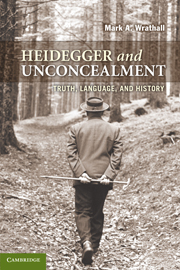Introduction
Published online by Cambridge University Press: 05 June 2012
Summary
“Unconcealment,” “Unverborgenheit,” was a term that first entered Heidegger’s philosophy as a translation for the ancient Greek word alêtheia. The more standard translation of alêtheia is “truth” (Wahrheit in German), but Heidegger elected to go with a literal translation: a-lêtheia means literally “not-concealed.” He did this because he believed the early Greeks thought of “truth” as primarily a matter of “making available as unconcealed, as there out in the open, what was previously concealed or covered up” (see GA 63: 12).
Heidegger eventually came to believe that the Greeks themselves had failed to grasp what was essential to the notion of unconcealment, what he had initially thought was hinted at in their word alêtheia. He thus set to the task of thinking the original notion more originally than anyone had before (see GA 9: 237–8). Heidegger’s thought can profitably be seen as working out the implications of the original understanding of unconcealment. To think unconcealment as such is to reject the idea that there are entities, we know not what, existing as they are independently of the conditions under which they can manifest themselves. Unconcealment is an event – it happens, and it only happens “with human beings” through “the creative projection of essence and the law of essence” (GA 36/37: 175). The thought of unconcealment also rejects the idea that there are uniquely right answers to questions like what entities are and what is being. Instead, it holds that we encounter entities as being what they are only in virtue of the world within which they can be disclosed and encountered. But these worlds are themselves subject to unconcealment – they emerge historically and are susceptible to dissolution and destruction. Thus being itself must be understood not as something determinate and stable, but in terms of the conditions for the emergence of entities and worlds out of concealment into unconcealment.
- Type
- Chapter
- Information
- Heidegger and UnconcealmentTruth, Language, and History, pp. 1 - 8Publisher: Cambridge University PressPrint publication year: 2010



